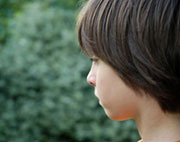- Could Your Grocery Store Meat Be Causing Recurring UTIs?
- Are You Making This Expensive Thermostat Error This Winter?
- Recognizing the Signs of Hypothyroidism
- 10 Strategies to Overcome Insomnia
- Could Artificial Sweeteners Be Aging the Brain Faster?
- Techniques for Soothing Your Nervous System
- Does the Water in Your House Smell Funny? Here’s Why
- Can a Daily Dose of Apple Cider Vinegar Actually Aid Weight Loss?
- 6 Health Beverages That Can Actually Spike Your Blood Sugar
- Treatment Options for Social Anxiety Disorder
Parents of a Child With Autism Often Forgo Further Childbearing: Study


Couples who have a child with autism are much less likely to have more children compared to other parents, a new study finds.
One expert wasn’t surprised by the finding.
“Clearly, parenting a child with an autism spectrum disorder requires a huge commitment of time, energy and money; this is a stress to couples and impacts siblings,” said Dr. Ron Marino, associate chairman of the department of pediatrics at Winthrop-University Hospital in Mineola, N.Y.
“There is no surprise that many people do not have the desire to undertake parenting more children in this context,” said Marino, who was not involved in the new research.
In the study, a team led by Neil Risch of the University of California, San Francisco, looked at nearly 20,000 families in California. All of the families included a child with autism born between 1990 and 2003.
These families were compared to a “control” group of more than 36,000 families that did not have a child with autism.
Parents whose first child had autism were about one-third less likely to have a second child than parents in the control group, the study found, while parents who had a later-born child with autism were equally less likely to have more children.
The researchers also found that parents of children with autism were likely to continue having other children until the child with autism began showing signs of or was diagnosed with the disorder. This suggests that not having more children is a decision made by parents, rather than a reproductive problem, the study authors said.
According to Risch’s team, in calculating the risk to families of having a second child with autism, most prior studies on the issue have ignored the fact that many families with an autistic child may have already made the decision to stop reproducing. That means the real risk of having a second child with autism may be higher than has been generally thought, they noted.
So, in the new study, Risch’s team accounted for the decision by some couples to stop having kids after they had already had a child with autism. When that factor was taken into account, there was about a one in 10 chance that the parents of child with autism who did decide to have more children would have a second child with autism, the investigators found.
The study was published June 18 in the journal JAMA Psychiatry.
“While it has been postulated that parents who have a child with [autism] may be reluctant to have more children, this is first time that anyone has analyzed the question with hard numbers,” Risch, a professor of epidemiology and biostatistics at UCSF, said in a university news release.
He believes that the “findings have important implications for genetic counseling of affected families.”
Study co-author Lisa Croen, an epidemiologist and director of the Autism Research Program at Kaiser Permanente Northern California, noted, “unfortunately, we still don’t know what causes autism, or which specific conditions make it more likely.”
And, she added, “We are hoping that further research will enable us to identify both effective treatment strategies and, ultimately, modifiable causes of the disorder, so parents won’t have to curtail their families for fear of having another affected child.”
More information
There’s more on autism at the U.S. National Institute of Mental Health.
Source: HealthDay
Copyright © 2026 HealthDay. All rights reserved.










